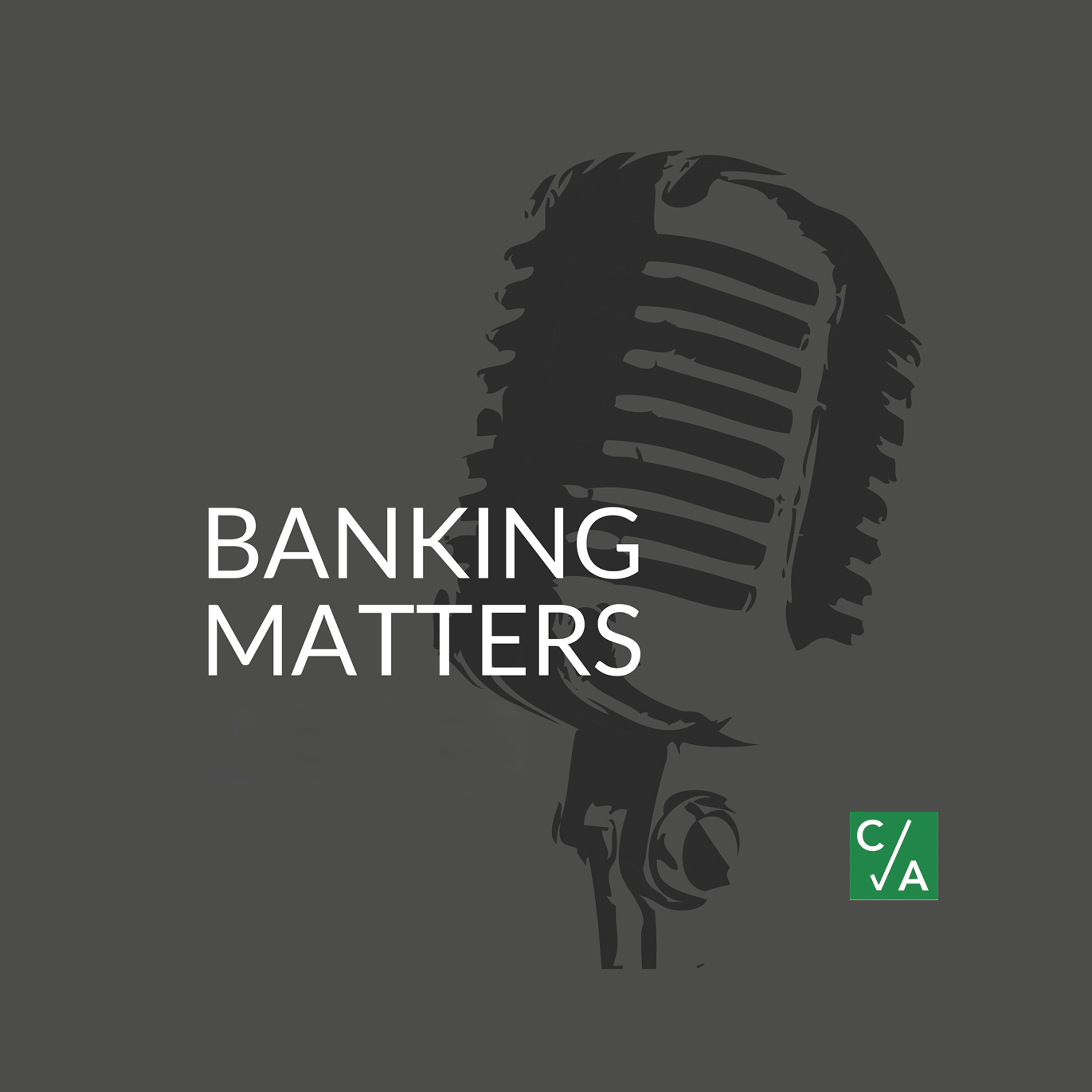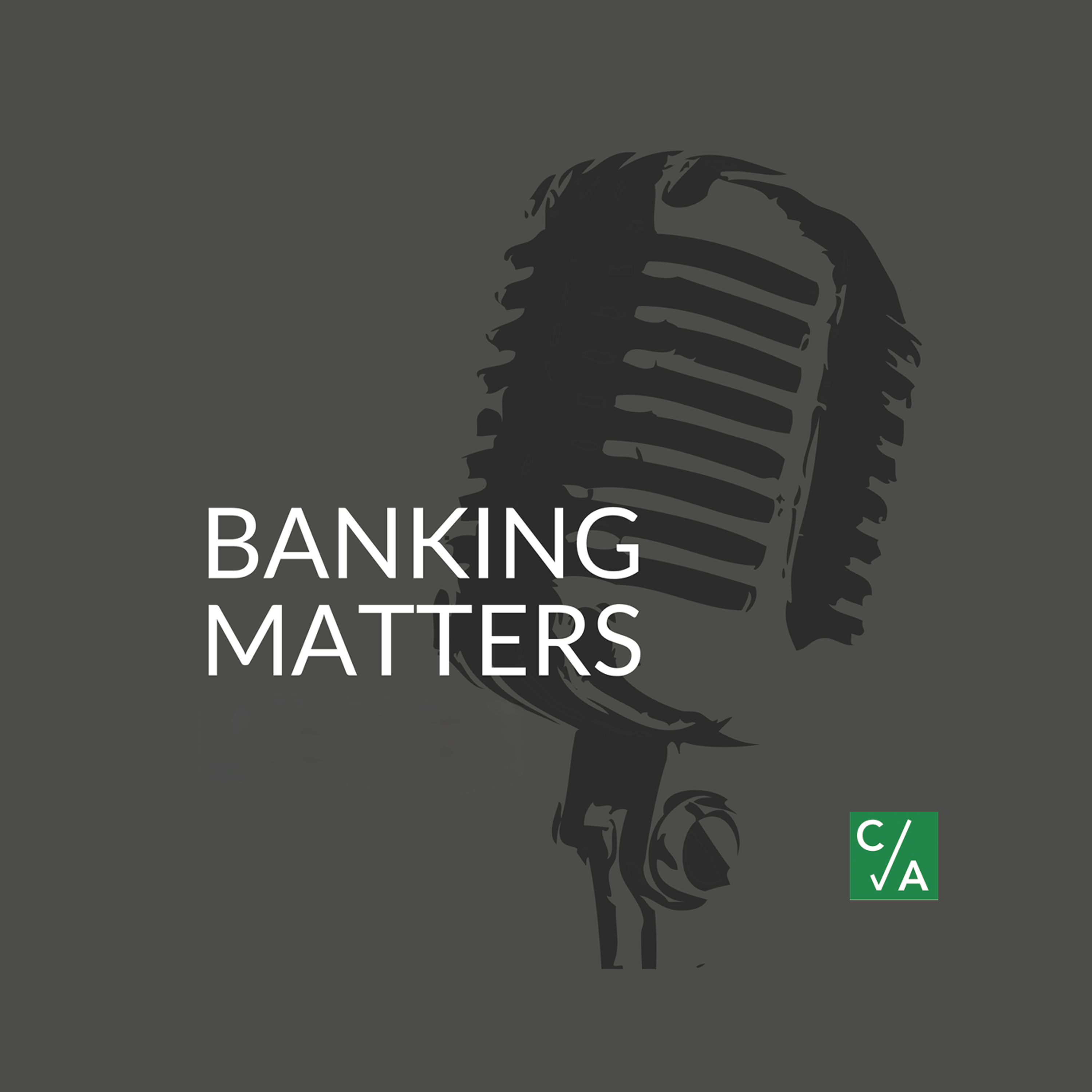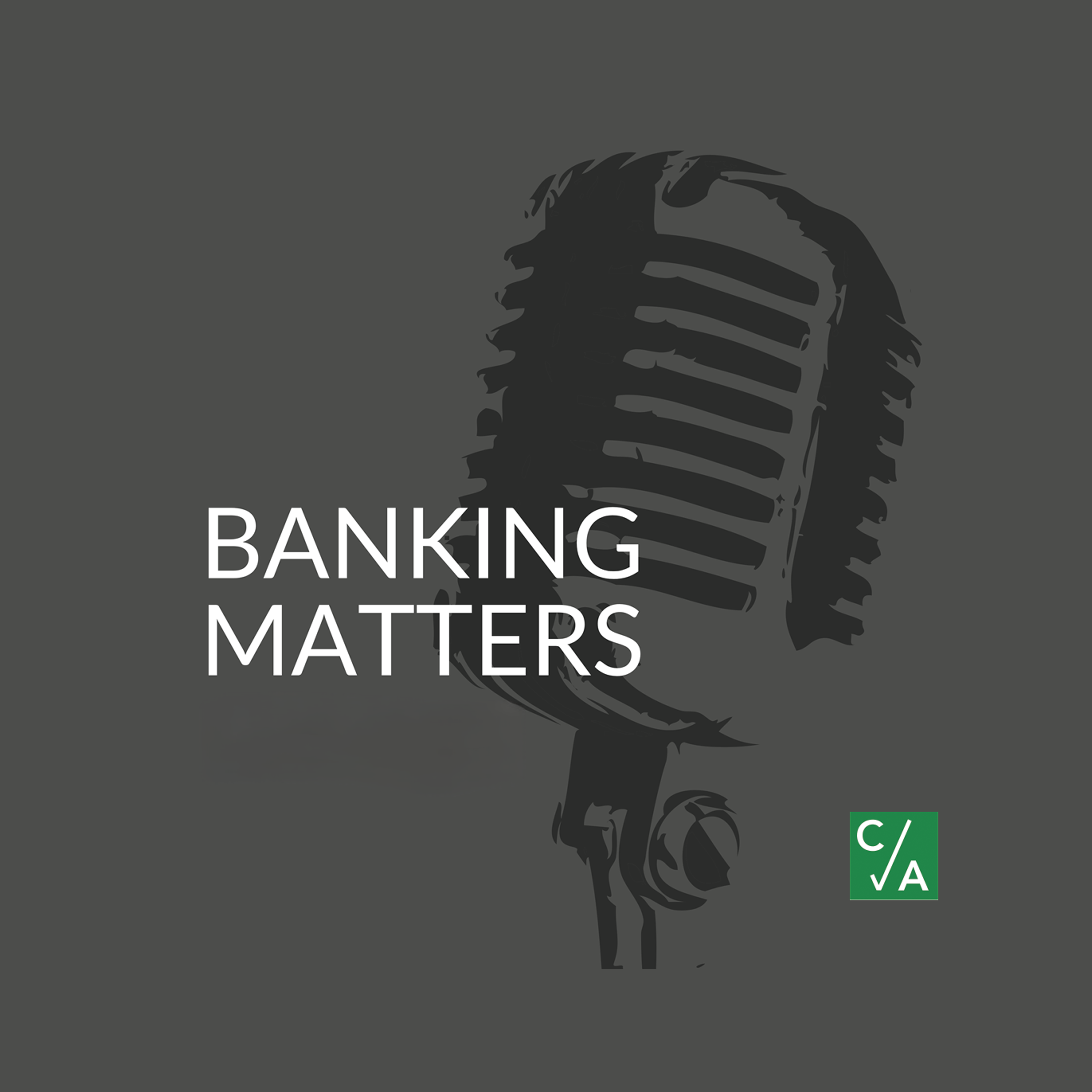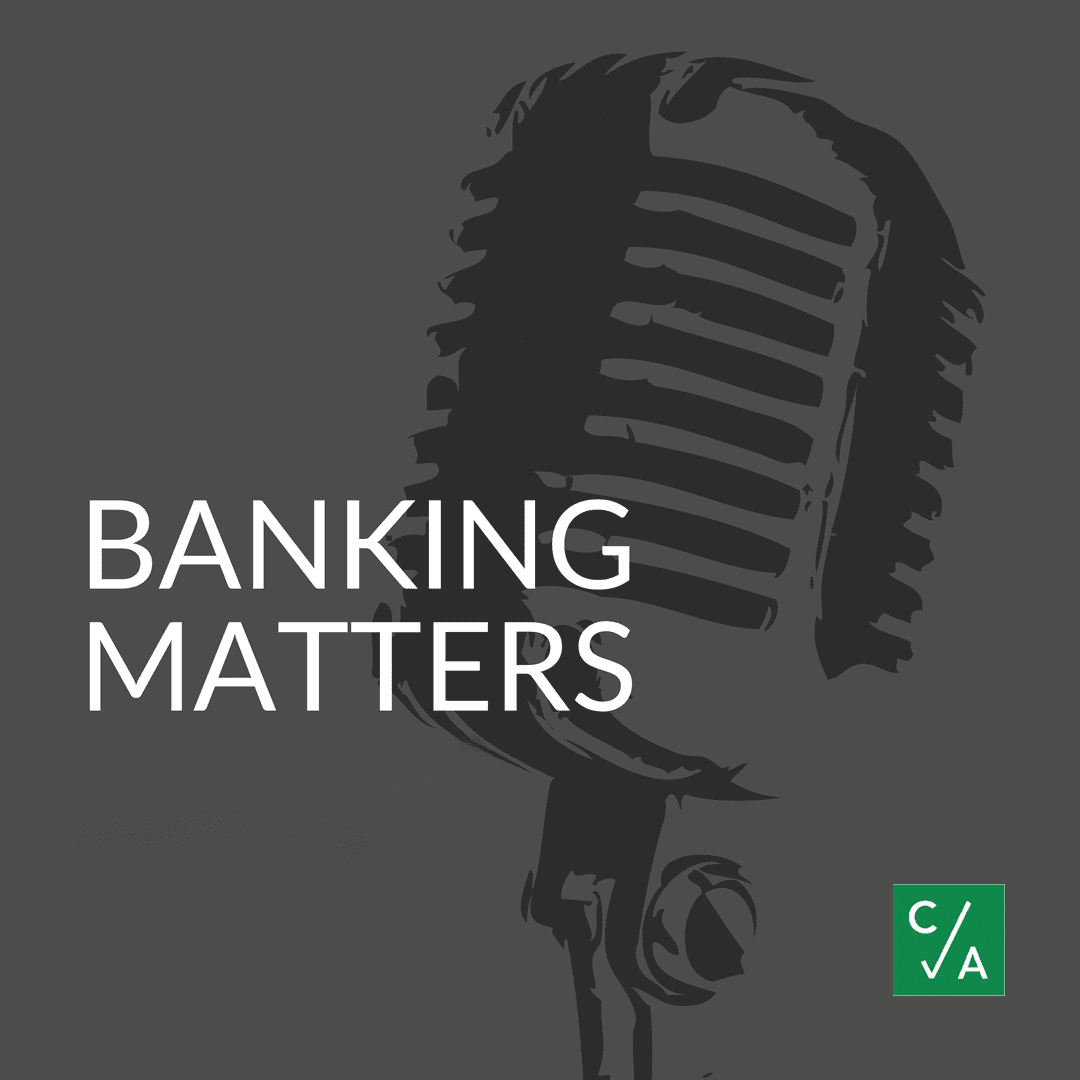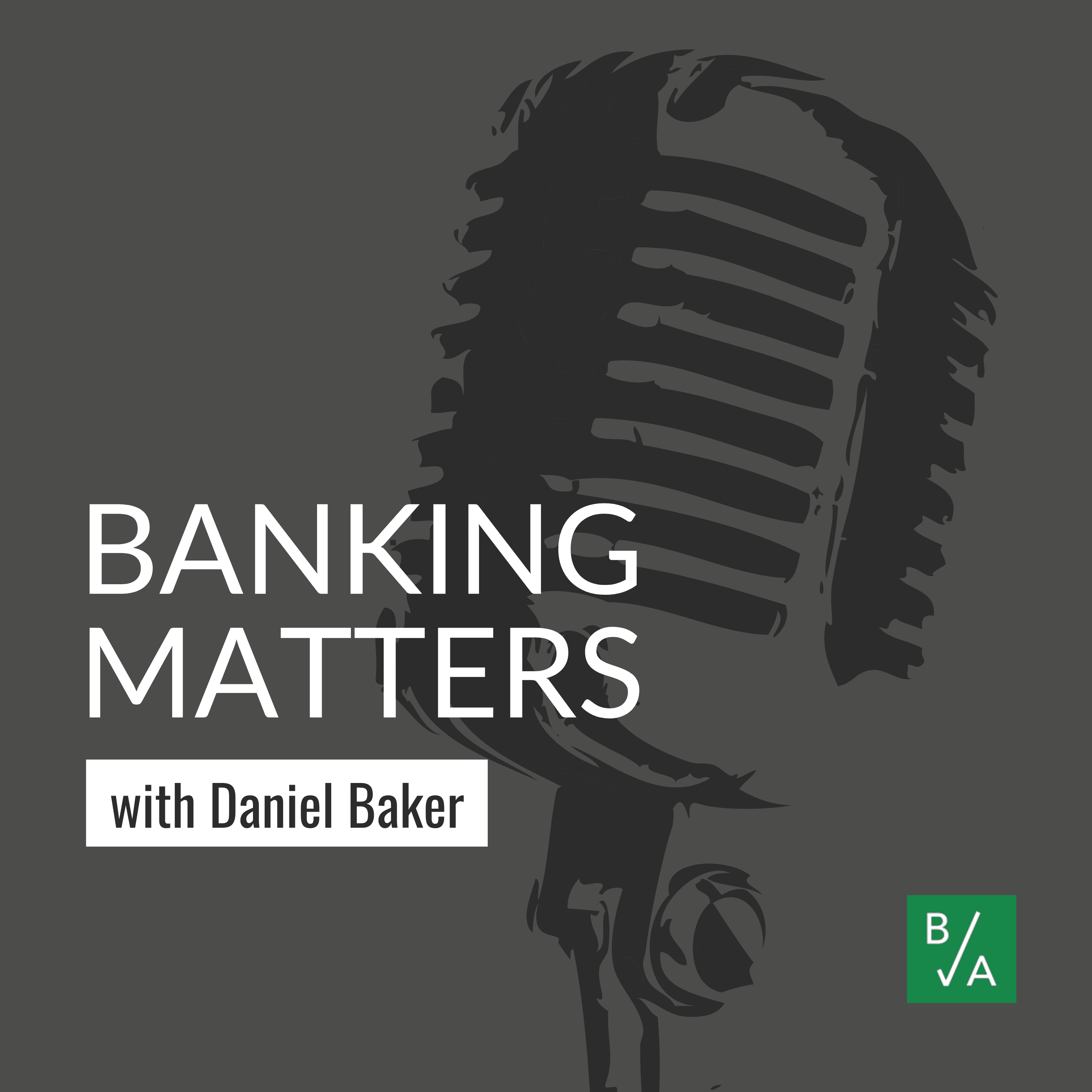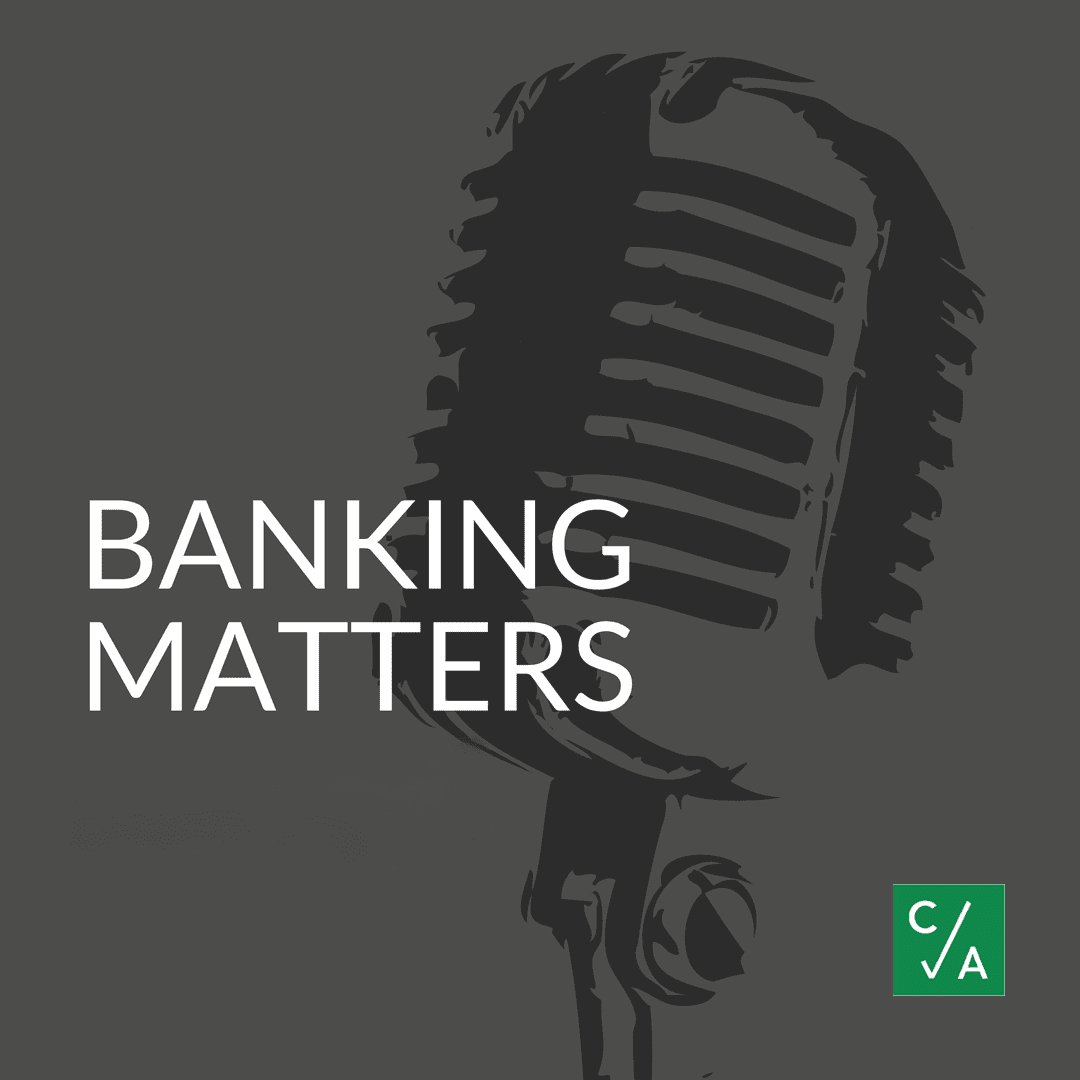Episode Transcript
Welcome to another episode of Banking Matters. I'm your host and joining me today is Mr. Jim Bensol. Jim retired in August of 24 as the Senior Vice President and Chief Compliance and Risk Officer for Bank South in Greensboro, Georgia.
Linsey (02:12.94)
He brings 40 years of experience in bank risk management, regulatory compliance, auditing, security, and corporate governance, working with both regional and community banks. Jim holds a BS in business admin from the Citadel, the Military College of South Carolina, and is a graduate of the ABA's National Graduate School of Compliance Management. Just to name a few of the many certifications he holds, he is a certified regulatory compliance manager, certified inter...
certified enterprise risk professional and a certified anti-money laundering and fraud professional. Recognized as a thought leader, Jim frequently speaks and publishes on risk management, compliance, and consumer protection regulations. He has chaired and served on numerous state and national banking committees, including the Georgia and South Carolina Bankers Association and the ABA Enterprise Risk Management Working Group. He has also served on faculty for the ABA National
school, the North Carolina School of Banking, and currently teaches at the Georgia Bankers Association Bank Compliance School. He now spends his retirement enjoying his family, travel, and as an active private pilot with an instrument rating. Welcome, Mr. Jim.
Jim Bedsole (03:27.592)
thank you. Don't call me Mr. Jimmy, just make me feel old. Just call me Jim. I guess I am old, but I am old, but you don't have to make me feel old.
Linsey (03:32.512)
It's a habit, I'm sorry. Well, just...
I'm sorry. Old habits die hard. So we are so excited. Listen, my mama would get me if I didn't. You know what I mean? It's always that sweet little lady. She's fierce but mighty. So, but thank you. We are so excited to have you here today. And I really am super excited to dig into our conversation and get your opinion on the conversation and the topic.
Jim Bedsole (03:42.004)
I know you're from the South too, so I get it.
Jim Bedsole (03:56.478)
Yo.
Linsey (04:08.3)
But first, here at Banking Matters, we always like to hear how you wound up in your career in banking.
Jim Bedsole (04:14.196)
So I did not set out, like most compliance officers, I did not set out to be a bank compliance officer. It was not on my radar. After kind of really kind of being undecided what I wanted to do with my accounting background from my college degree, I eventually stumbled on internal audit as a option that sounded pretty appealing. And as it happened, one of the companies that was recruiting on campus as I was about to graduate was
legacy Wachovia Bank back when they were just a North Carolina bank. They were recruiting on campus for personal bankers, but they had in their literature where they had just established within their internal audit program kind of a career path within internal audit. And I thought that sounded interesting. So I signed up for the interview, even though they were recruiting personal bankers, went into the interview and I told the interviewist that I don't want to be a personal banker. I want to be an internal auditor.
we did the interview and he said that he would pass my information on to one of the regional auditors who ultimately wound up hiring me as a staff auditor for for Wachovia Bank. Now this was back in the mid 80s when compliance really wasn't even a career path for most banks. In fact, Wachovia Bank did not have any such, they were, I mean, they were a $25 billion bank. They did not have a position of compliance officer. That position didn't even exist.
But our internal audit team was charged with doing some compliance testing as part of our audit processes. And my internal audit team found out I had a knack for being able to read the regulations and then help everybody figure out, what did it mean and what should we be looking for as auditors? And since I had that knack, kind of ultimately evolved as community banks started moving towards a kind of hybrid internal audit and compliance role. I wound up wearing both hats.
left Wachovia Bank and went to work for a community savings and loan and wearing both hats, compliance and audit. And then ultimately through the remainder of my career, kind of had both of those responsibilities in my umbrella, but shifted more towards a specific focus in compliance early on. again, really just was able to kind of continue to morph that into a broader risk management responsibilities and things like that. But compliance was...
Jim Bedsole (06:39.218)
I also had a passion for compliance. I really enjoyed it. I enjoyed digging into the regulations and parsing them out and figuring out what they meant. I enjoyed teaching as well. so being able to explain that to others as well really kind of shifted my career into a very heavy compliance focus.
Linsey (06:57.11)
Yes, what I have a son that's a sophomore in high school and I try to talk to him all the time that life is not just the hard skills that you have, but there are those soft skills. And I have found that my passion for helping people understand the why behind why they have to do things, the reason, just in life in general, I try to do that with my kids that then also with work too, it makes everything click so much more. And so that's definitely
really awesome the way that you kind of just figured it out. And also I hadn't thought about the fact that compliance wasn't such a big deal.
Jim Bedsole (07:35.796)
What even a thing?
Linsey (07:40.386)
That's wild. So I do want to know that as you're 40 after looking back on your 40 year banking career, do you think compliance has gotten harder or easier? Because we've just said it wasn't really a big focus, but I also know that that was probably like the wild west of you probably saw a thing that you were supposed to be achieving and then there's nothing, no guidance.
Jim Bedsole (08:09.074)
Yeah, I think it's gotten both harder and easier. And I say that really, guess, so from the standpoint of having gotten easier, back when I first started compliance, the internet wasn't a thing yet. It was just really in its very infancy. The World Wide Web did not exist at all. And so,
getting compliance information was challenging. In fact, the first community bank I worked for, they did not have a subscription to the Federal Register, but the State Trade Association had a subscription to the Federal Register. And they would take, when banking regulations came out in the Federal Register, they'd circulate that around to all of the bank CEOs. And the bank CEO would kind of let it sit on his desk for a couple of months. And then,
ultimately channel it to the compliance officer and say, hey, here's this new regulation. It went into effect two weeks ago. We need to comply with this. So just the timeframe of being able to respond to regulations was much harder. And even access to the regulations. Again, we had the old four volume brown FDIC books that you had to change the pages out every month and they were little onion skin pages. And within a couple of months, you're
manual was useless because you had pulled out the wrong page or put the wrong page in somewhere and later on somebody wasn't going to be able to find what they wanted to find. But as it started evolving again it evolved into first there were some subscriptions available of the regulations on CD-ROM disks and so you could get all of the regulations on a CD-ROM disk except the company that was selling those nobody had CD-ROMs in their computer so if you subscribe to their program
they would actually send you a free CD-ROM drive for your computer that you could install in your computer and then be able to read the CDs on your computers. And then ultimately the internet kind of came along and you know, after Al Gore invented it, it kind of took root with the government and they started publishing federal register online and you could access all of that information. So that standpoint, it's gotten much easier to get anything you want from a regulatory standpoint.
Jim Bedsole (10:29.764)
right at your fingertips now. mean, you can do a Google search and pull up the Federal Register just like that. So it's gotten easier from that standpoint, but it's also gotten a lot harder because you talk about the Wild West then, really, mean, banking was still pretty generic and basic. And now you've got all this new stuff like artificial intelligence and cannabis banking and, you know, all of these different things that are components that have really complicated the landscape that
None of our regulations were even designed to address, you know, you've got, you know, FedNow payments and, you know, peer-to-peer payments and all of this stuff that, you know, Reg E wasn't even designed. So it's gotten a lot harder from that standpoint of a lot more things to try to keep up with and not necessarily clear guidance.
Linsey (11:19.106)
Yeah, for sure. No, I completely agree. And sometimes I feel like growing up in a time where things have changed exponentially throughout my life, that is just kind of an expectation of life that I probably have. Whereas I feel like, especially life before the internet, because my siblings are much older than I am. And so we've kind of talked about it. They were like, well, we had an entire life before the internet. I was an adult before the internet.
And they were like, that just rapidly changed so much. I mean, would be ignorant of me not to think that it would do the same thing for banking as well. And so kind of pulling back. go ahead.
Jim Bedsole (12:01.682)
Yeah, I was, I was fortunate.
I was fortunate because early in my career, I saw how critical, I was able to foresee how critical the internet was going to be. And so I made it a point to kind of learn all I could about that. I self-taught myself how to do HTML programming so that I could create web pages and actually created our bank's first intranet page was our compliance manual on the intranet that I was able to create in HTML programming to.
create those pages and stuff because I wanted to kind of be aware of kind of what's happening in that world and to really help. Again, that's really kind of how I wound up getting also onto like the national speaking circuit because at that time, one of the national trade associations was doing seminars around the country talking about internet banking and the coming thing of internet banking and things like that. And I got to be part of that program. we would go into a room of
200, 250 bankers and we'd ask the question starting on how many of you have an internet connection at your bank and maybe two or three hands would go up? We'd like, don't worry, you will, you will.
Linsey (13:13.966)
And so that speaks so much to these skills. feel like you, it sounds like you have just an innate sense of curiosity. So what skills do you think many CO compliance officers don't necessarily naturally have, but they need to foster in order to be successful?
Jim Bedsole (13:34.908)
I think, yeah, I think the first thing that, and the thing I've run into in teaching in compliance schools and things like that, the first thing is I think there's, know, compliance officers don't necessarily have a lot of confidence in public speaking. And you need to have that. You need to have that confidence in public speaking to be able to get up in front of the board and not fall all over your words and stuff like that when you're trying to make a presentation to your board. So.
you know, getting that public speaking experience. And there's great organizations like Toastmasters that can really help foster. For me, that was one of the things I joined Toastmasters to really learn how to be able to do public speaking because I knew that training was going to be such a big part of it, not at every level of the organization where I needed to be comfortable with doing that. So I think, you know, that public speaking, but then also just really developing an executive presence.
I think for compliance officers who want to be seen as, ultimately get promoted into a senior management position, I think you've got to develop that executive presence kind of personality of being able to be a part of that's being a team player and not just, you know, not just, you know, saying no to everything, but figuring out helping to be problem solving and, moving in that direction. So I think that, you know, that executive presence is important. And I think selling skills.
We always look at the commercial bankers and yeah, they're just salespeople, that's all they do, they know how to sell. But guess what? Convincing people to comply with regulations is a selling job. And the more selling skills you have and the ability to be able to overcome objections and to figure out what the customer really wants and how you can tailor your product to meet what it is they're really looking for, that's a key to being a successful compliance officer as well. so...
While compliance officers don't see themselves as salespeople, they really need to be salespeople.
Linsey (15:35.308)
Absolutely, I love that mentality because that's not something that someone necessarily ever puts with a compliance officer. But that viewpoint, honestly looking back on my own career, has probably been one of the top reasons as to why not only, like you said, a natural knack for being able to understand regulations and help communicate that to people that may have a hard time to do that, but also to...
be able to talk to people, sell things and get that buy on. Like I said, that's always been my goal as a compliance officer because I'm only as good as the rest of my staff. You know what I mean? Because it really is a team effort. So along those same lines, do you think as a compliance officer, is it better for someone to be
a jack of all, what is it, jack of all and a master of none or is it better to kind of hone that down into a specific skilled area?
Jim Bedsole (16:38.228)
That's such a tough question. It's one of those things. Through my career, I was always a generalist. I tried to stay up on it. And because in a lot of, especially in a community bank environment, a lot of times you are the compliance officer. So you have to be a generalist. You have to know deposit compliance and loan compliance and VSA compliance. you have to know all of it because you are the only resource for that.
But as you get into some of the regional banks and larger banks, you tend to get more specialized folks that kind of come up and they get niched into it one specific component, whether it's deposit compliance or loan compliance, whatever. And if you don't learn the skills and learn the regulations associated with the other parts of that, you're really not setting yourself up for...
kind of that future promotion where you are going to have responsibility for a broader book of business that you're responsible for. To be able to have that generalist mode I think is still important. Even if you're in a specialized function, take the opportunity to stay up to speed on what's happening in the other part of the banking compliance worlds that you don't have necessarily job.
responsibilities for. And we tell that people to, you know, we've said that often to people coming into our compliance schools, because sometimes we have people come into compliance schools that, well, I don't want to do the lending courses because I'm only responsible for deposit compliance. Well, that's good today, but that might not be true tomorrow. What if your bank gets acquired and they say, hey, we don't need you in deposit compliance anymore. We need you in loan compliance and you don't have the skills to go there. So we'll see you later. You know, you don't want, you don't want to be in that boat where you're not
Linsey (18:25.784)
Yeah, it's definitely the activity.
Jim Bedsole (18:28.846)
able to move where they need you to move. So I think it is important to stay up to speed as much as you can on all of the areas of compliance. And that may mean taking some of your personal time because the company isn't necessarily going to make that time available to you to keep up with that. You might have to take that as part of your own, you know, taking care of your own career because nobody else is going to look out for your career except for you.
You might think that the company's gonna kind of worry about your career, but they're not. You have to take responsibility for that, and you have to be willing to make the investment that's gonna ultimately lead to success, long-term success in your career.
Linsey (19:09.87)
One of my favorite supervisors, always told me, no one can ever take learning or knowledge away from you. And he was like, never put yourself in a position to stop learning. And honestly, I attribute that big push to where I am now because he was very much like, go, do, chase, learn, and it stuck with me all these years. And so along those lines, what would you...
What are some things that you would want young compliance professionals? What can they do, we do to enhance our careers?
Jim Bedsole (19:51.39)
Well, think the first thing I'll talk about here is kind of the importance of mentoring. And I look at it from both standpoints, both from being mentored, which I think every compliance officer kind of coming into the role should seek a mentor. And they really are kind of a couple of mentors. One is they should seek a mentor within their organization, somebody that can help foster them, navigate them through the corporate politics landscape of their company, who can help them.
navigate through the pushbacks and things like that, but also to seek a mentor from a professional standpoint. Maybe it's not even in the company, but a more seasoned compliance professional, if you will, that can kind of be your sounding board and somebody you can reach out to. And again, compliance schools and compliance conferences and stuff like a great way to kind of identify maybe some of those people that might be a suitable mentor for you. And then
Be willing to be a mentor yourself because it's not going to take you very long before you're not going to be the new guy on the block and you're not going to be the new kid. And who's coming behind you? And be willing to mentor them because you're going to learn some things through that process yourself too that are going to enhance your ability to be able to lead and manage and direct people. And to that end,
Take every opportunity that's given to you to lead. If you have an opportunity to take the lead on a project, take the lead. And yeah, you might not feel comfortable initially in that process, but you're gonna learn so much through taking that leadership and you're gonna develop skills that are gonna serve you long-term in being able to move those projects through. remember, again, early in my career,
you know, one of the first regulations I had to deal with implementing in our organization was RegCC when it first came out in 1989. I was working for a small savings and loan association and I was the one who they say, hey, we got this, we got this whole complicated new regulation. We need somebody to help us put this in place. I'm like, okay, well I'll do that. And took the lead on kind of putting that project in place and.
Jim Bedsole (22:14.728)
you know, helping to navigate the tellers through what they needed to do, helping to navigate the systems folks through what the systems needed to do in terms of check holes and things like that. And to this day, RegCC is probably my favorite regulation simply because it was so complicated at the time and it was so complex and for every rule there was an exception and for every exception there was an exception to the exception. And it was so fascinating to
put that in place. so, but taking that opportunity to lead that effort really helped develop leadership skills in me that, you know, made a difference throughout my career. I mentioned earlier, you know, about learning how to say no without saying no. You know, I think that's another thing that compliance officers absolutely need to learn to do is, you know, be willing to say, you know, instead of saying no, say, well, you know, is there another alternative? Is there another way we can do this?
Yeah, we can do this, but here's what the risk we run in doing this is. So maybe we need to think about a different alternative, but not just coming out and say, well, no, know regulations say we can't do that. If that's what you get known as, if you get tagged as Dr. No, and actually at one point at bank south, one of the, when I first joined there again, their chief operating officer, he did start tagging me as Dr. No, even though I wasn't.
you know, saying no and everything, just because he didn't like compliance. He, Dr. No. And I said, well, yes, that's Dr. No, it's K-N-O-W. Yes, Dr. No.
Linsey (23:46.06)
Ha ha ha!
Linsey (23:49.748)
You
Jim Bedsole (23:49.854)
So that's the no you want to be known for, the K-N-O-W no, not the N-O no. I think staying flexible and being willing to adapt, being willing to be a team player and sometimes recognizing that compliance risk management is not compliance risk elimination. And sometimes you have to be willing to let management take the risk.
Linsey (23:55.532)
Yes.
Jim Bedsole (24:17.17)
Because that's how we make money as banks. We make money by taking risks. And if we eliminate all the risk, we eliminate all the money. And then we eliminate all the jobs. So you have to be willing to allow them to take the risk. You have to make sure that you've explained to them the risk clearly and that they understand that. But if they're willing to take the risk, then be flexible and don't make that the hill you're going to die on. And I think giving back to the industry, I think for all of us, and this is where again where I spent
Linsey (24:25.794)
Right.
Jim Bedsole (24:47.006)
kind of the latter part of my career is really wanting to give back because there are so many people, if I look back on my career, so many people that poured into me earlier in my career that helped me grow from, not from the bank I worked for, but from other banks throughout the country that served as mentors for me, some of the compliance giants like Lucy Griffin and Phil Gay and Richard Inslee and folks that were,
the first conferences I went to, I looking at these people, was like, wow, these people are so knowledgeable, they're so smart. But they poured into me. And I tried to do that back through my career as well. That's one of the reasons why I've made a point, even in retirement, wanting to of pour back into the industry a little bit and kind of help that next generation. And I think that's important for all of us as compliance professionals to be willing to carry it forward.
Linsey (25:44.99)
Absolutely. And also, I've just in my position with the banks that I get to work with, we've seen so much turnover because the next generation is moving in. And it is a huge passion of mine to let people know because I had no idea in college that this is what I wanted, that this is what I was made to do. And so like you say, my big thing is I'm going to
our kids, my kids high school, go to my alum, my college that I graduated from and I go and I speak about all of the opportunities because there's so many people that you don't know what you don't know. And I've just, and like you said, there are such a wide range of skill sets that can bolster the success of a compliance officer that I feel like when people think, compliance, you do get known as just this grumpy person that reads the law.
Whereas if you are kind of an effervescent kind of person and you understand the bigger picture, it can really lead to a really cool career.
Jim Bedsole (26:54.644)
Well, and I think it is one of the things to recognize is that a lot of compliance officers, they wind up getting drawn into it because many compliance officers are natural introverts. And I am a natural introvert. I promise you. I may not sound like it on this recording, but I am absolutely a natural introvert. Now I've learned to adapt and overcome and be able to be that outgoing kind of a personality and to do that.
Linsey (27:08.555)
you
Jim Bedsole (27:20.884)
But at the end of the day, when we get done with this interview, I'm gonna need some alone time to wind down a little bit because I am a natural introvert and many compliance people are. That's why we are comfortable reading regulations for hours on end. But you have to learn to play in the other arena.
Linsey (27:37.836)
This is
Linsey (27:42.528)
Yes, yes, which is honestly kind of an even bigger skill set, a hurdle, if you will. But Mr. Jim, Jim, sorry. What is one piece of advice that you would like to leave our listeners today as we wrap?
Jim Bedsole (27:59.07)
Well, I think again, kind of as I'm in retirement mode now, and I've talked with, again, talking with my peers who are also retired or recently retired and things like that. I think recognizing that bank compliance isn't the be all and end all. Expand your interests. Don't have compliance be your only interest. Engage in hobbies, engage in...
other things that you're going to be able to lean on when the day comes that you are no longer doing this. And hopefully for all of you that day will come when you're going to be able to say, I'm done with this. I can spend my time doing what I want to do. But have something that you want to do then because there's so many people that get to that point and then they don't have anything that they want to do. And they wind up sitting around all day watching TV and
and ultimately wasting away. So don't let the world pass you by while you're so focused on compliance that you don't delve into other things that might interest you.
Linsey (29:06.35)
love that. Well, thank you, Jim, so much for your time and your wisdom. And for the rest of our listeners, that's banking matters. That was really great.
